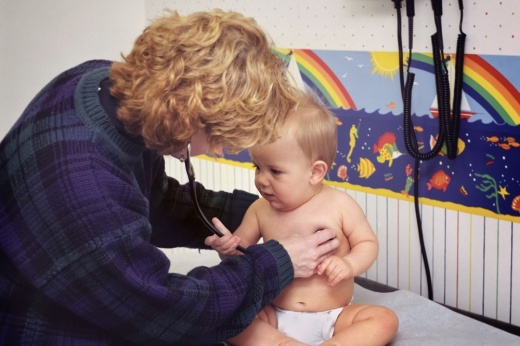Anyone can be infected with and spread the virus, which is commonly known as RSV. However, very young children—newborns to 2-year-olds—are more likely to experience more severe symptoms, including bronchiolitis and pneumonia, according to the Texas Department of State Health Services.
“[RSV causes] a lot of mucus, and little people have airways that are really small,” Harris said. “Their airways get sort of clogged up with the secretions, and you see hypoxia and difficulty breathing.”
Hypoxia occurs when there is not enough oxygen in someone’s body tissues to sustain normal bodily functions.
This year, Harris said more toddlers, from the ages of 2-4, have been admitted to Dell Children’s for serious RSV cases.
RSV season varies annually, but case activity typically increases in Texas around September or October and peaks in December or January, according to the DSHS. This year, cases began to surge as early as October across the state.
Data collected by the state health department shows that RSV cases reached a peak between Oct. 8-21. Case counts have declined since then, but medical officials do not know if cases will continue to fall or if Texas will experience another spike this winter.
In Central Texas, approximately 250 positive RSV cases were recorded during the week of Nov. 19, which was the latest available data at the time of publication. Of these cases, 200 were reported from PCR tests, and 50 were from antigen tests. Physicians are not required to report RSV cases to the state, so case levels are likely higher than the data shows.
Around the same time last year, less than half as many cases were reported in Central Texas. Data shows that just over 100 positive RSV cases—most of which came from PCR tests—were reported during the week of Nov. 20, 2021.
PCR tests take longer to process, with a return time of about 24-72 hours, while results from antigen tests can be read within 15-30 minutes. However, PCR tests are more accurate, according to the University of Massachusetts Chan Medical School.
Harris said precautions used to prevent the spread of COVID-19—such as wearing masks, social distancing and working from home—also prevented people from contracting RSV, the flu and the common cold. This resulted in reduced immunity across Texas, so more people have contracted RSV this year.
Emergency rooms across the Dell Children’s system have taken in “twice the volume” of children compared to a typical autumn, Harris said.
“We get calls from all around the state,” Harris said. “There are other communities that are less fortunate than us, and we have been asked to take critically ill children from as far south as Del Rio and as far north as Plano. This is not unique to Austin.”
Harris emphasized that emergency room wait times are longer than normal.
“[If families are] coming to the emergency room, we ask them to pack a lunch or bring coloring books,” she said. “But if your child is really sick, you’ll get seen right away.”
Dell Children’s has also asked families to seek other care before heading to the emergency room in nonemergency situations. Harris recommended taking children to a pediatrician or their primary care provider if they have mild symptoms similar to a cold or the flu.
According to the DSHS, symptoms of RSV are similar to other respiratory infections. For older children and adults, symptoms include a mild fever, congestion/runny nose, cough and sore throat, headache, fatigue, and occasional wheezing. Children younger than 2 years old are more likely to experience severe symptoms, such as bronchiolitis and pneumonia, a cough with a “barking” sound, rapid or difficulty breathing, middle ear infections, and bluish lips or fingernails.
RSV symptoms typically appear within 4-6 days after contracting the virus, according to the DSHS.
Infants and premature babies are more likely to have severe RSV symptoms, according to UT Health Austin. Children who have asthma, an underlying lung disease, congenital heart disease, Down syndrome or other immunocompromising conditions may be at high risk for RSV.
Influenza also hit Texas earlier this year, according to state health officials. Flu cases in Texas and other parts of the southern United States were at “very high” levels in early November.





